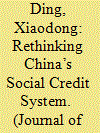| Srl | Item |
| 1 |
ID:
154820


|
|
|
|
|
| Summary/Abstract |
Empowered by the media, legislations in China have, over recent years, been increasingly influenced by public focusing events. Many national legislations have been triggered by public focusing events, rather than being entirely pre-determined by the Party or by the government. After a detailed empirical study of 132 public focusing events and national legislations between 2003 and 2016, the article explores the features, the reasons, and the advantages and disadvantages of legislations triggered by public focusing events. In these ‘pressure-induced legislations’, the public focusing events serve as catalysts that create a new consensus or demand for new laws and regulations that are enacted over a short period of time, thereby influencing the national legislation. Compared to traditional Chinese legislations, pressure-induced legislations are more efficient and more responsive to the needs of the general public, but they also carry the danger of irrational judgments being made, leading to the enactment of improper laws or regulations.
|
|
|
|
|
|
|
|
|
|
|
|
|
|
|
|
| 2 |
ID:
181213


|
|
|
|
|
| Summary/Abstract |
China’s plan to establish a social credit system (SCS) has aroused the concern of building a surveillance state. Yet this view oversimplifies and misunderstands the essence of the SCS. The highest priorities of the SCS are promoting economic credibility and reinforcing court orders. Meanwhile, the SCS aims to steer citizens’ social behaviors and interactions by utilizing a redlist system that introduces numerous moderate rewards. The SCS is also more lax in execution than in planning. It reflects a unique Chinese understanding of law, which treats law as a moral guide. This article also acknowledges the concerns for the SCS. Without actively preventing positive and negative invasions in the construction of the project, the SCS authorities will risk creating further mistrust in society.
|
|
|
|
|
|
|
|
|
|
|
|
|
|
|
|